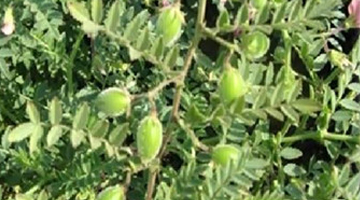 Consumers nowadays are becoming conscious of what they eat, obsessively watching their food intake. Many opt to include legumes in their diet as a replacement for meat and as a major source of protein.
Consumers nowadays are becoming conscious of what they eat, obsessively watching their food intake. Many opt to include legumes in their diet as a replacement for meat and as a major source of protein.
Chickpea (Cicer arietinum L.), also known as garbanzo, is a legume, whose seed on the average contains 23% protein. In addition, the country has been importing 735 tons of chickpea per year during the past decade.
Recognizing chickpea’s health benefits and contribution to the country’s economy, Dr. Fernando R. Gonzales of the Benguet State University (BSU) in La Trinidad, Benguet is studying how the legume can be introduced and promoted in the Cordillera Administrative Region (CAR) via a project “Introduction, evaluation, development of package of technology (POT), and promotion of chickpea (Cicer arietinum L.)”.
Two types of chickpea were used, the Desi and Kabuli types. Desi types are small to medium in size; have higher fiber content; and are used in making splits (dhal) and flour (besan). Conversely, Kabuli types are large seeded; has low fiber content; and generally used as whole grain.
As an initial step towards product development, postharvest and processing qualities of these chickpea types were studied. ICCV 93954, a Desi type, obtained the highest milling recovery, which was used in making nutri-based food products such as cookies and “puto” or rice cake.
On the other hand, Kabuli types such as ICCV 92311, 07307, and 95334 showed the highest acceptability among the respondents of a sensory evaluation conducted.
Through a collaborative project with the India-based International Crops Research Institute for the Semi-Arid Tropics, a POT is being developed through different studies on planting distance, weeding, fertilizer, and irrigation.
Other major accomplishments include the identification of promising varieties based on their growth performance and yield production of both Desi and Kabuli types for the highlands (Desi: ICCV 93952; Kabuli: ICCV 92311) and lowlands (Desi: ICCV 93952 and 07114; Kabuli: ICCV 95322 and 92311) of CAR.
The three-year project, partially funded by PCARRD, is now on its last year of implementation. By the end of the project, it is expected that chickpea varieties adaptable to CAR conditions will be identified; adoption of chickpea varieties in CAR will be enhanced; and healthful chickpea-based processed foods and products will be developed.
